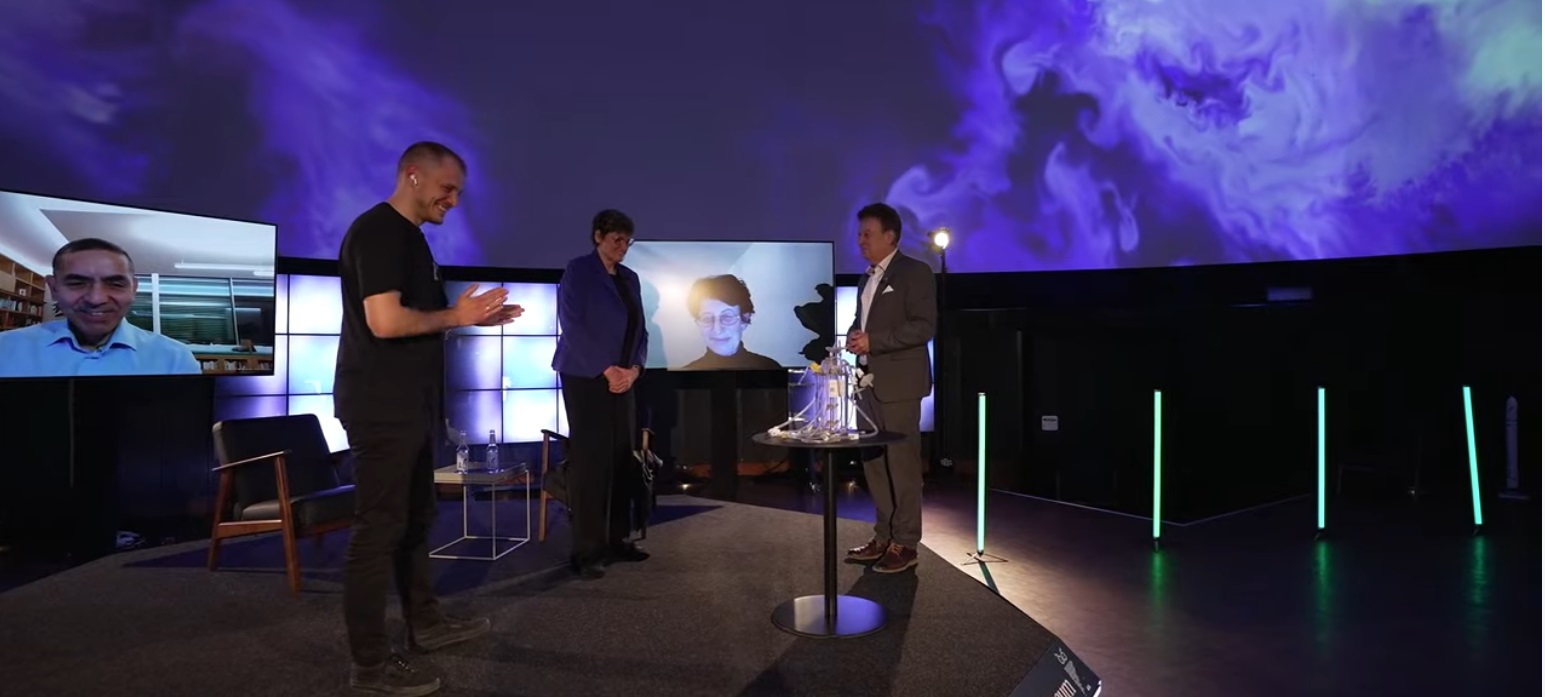
The Deutsches Museum organized a podium discussion about the mRNA revolution. Three leaders of the BioNTech Group, who were awarded the German Future Prize, took part in a roundtable interview on 25 November 2021 to close the “1E9” conference promoting science. The vice-president, research biologist Katalin Karikó, handed over the instrument, which can be considered the ‘cradle’ of the very first mRNA vaccine, to the Munich exhibition site.
As the ambassador of science promotion, biochemist Katalin Karikó, honorary doctor and alumna of the University of Szeged, took part in the podium discussion closing the conference “1E9” on the evening of November 25, 2021. The two doctors who founded BioNTech, Uğur Şahin and Özlem Türeci, took part in a live interview called “The MRNA Revolution” with the help of the World Wide Web.
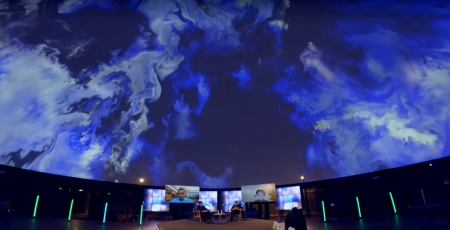
"IT’S A JOY TO BE A SCIENTIST"
Leaders of the Mainz-based company BioNTech have received the German Future Prize for the development of mRNA vaccine designed to prevent Covid-19 disease and control the pandemic. The German Federal President's award for technology and innovation also includes mRNA technology researchers explaining their achievements in science to the general public.
What motivates a researcher to engage in messenger RNA? Katalin Karikó and her colleagues in Germany answered the question that started the podium discussion, emphasized that the research work is enjoyable and it is a pleasure to be a scientist. The panel discussion can be viewed on the website of the Deutsches Museum.
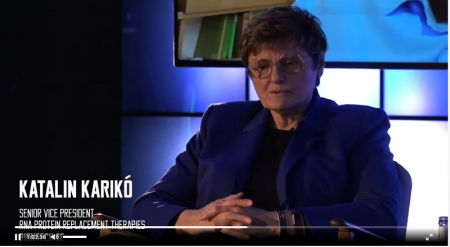
WHO HAS INTERGRATED mRNA INTO THE WORKFORCE?
The question has emerged: the results of the last six decades of mRNA research are condensing into the world's first approved SARS-CoV-2 coronavirus vaccine. The three leaders of the BioNTech group recalled stories, also told in previous interviews that can be made comprehensible for an outsider: the role of personal preparedness, perseverance, dedication, ingenuity, and chance in research success.
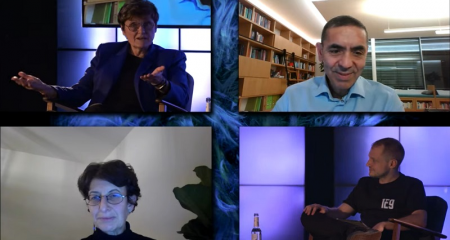
Katalin Karikó mentioned for example, that she had first heard of the possibility of using mRNA in medicine in Hungary, but further development of science and technology were needed to finally uncover the secret of messenger RNA in her American workplace, despite the omissions. Examining the RNA-mediated immune response, she discovered that modifications of nucleosides in mRNA can suppress protein production. The solution she offered to the problem made it possible for mRNA to be utilized.
THOSE WHO HAVE A “MORAL OBLIGATION” TO HELP
How can we use the mechanisms of our immune system to fight cancer? This question excited the medical couple. Uğur Şahin and Özlem Türeci said they wanted to develop immunotherapy for the complex disease of cancer, hence the mRNA coming into the picture. Methods have been developed for the delivery of mRNA to dendritic cells.
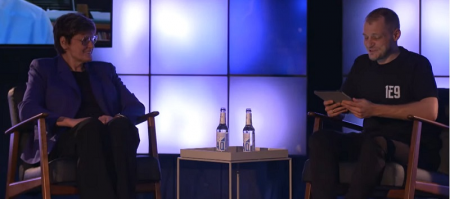
The role of BioNTech, founded in 2008, and the meeting between the Turkish couple in Germany and the Hungarian biochemist working in the American university laboratory in 2013 were also discussed in the round interview. For example, an article in the medical journal The Lancet on January 24, 2020, describing cases of a smoldering pandemic, revolutionized BioNTech's life. It was then that Uğur Şahin stated that his company had a “moral duty” to contribute to a quick response.
HOW DOES A RESEARCHER CELEBRATE?
The correlation of developments, innovative technologies and the collaboration of scientists with different perspectives were all needed for the production of the BioNTech mRNA vaccine to be authorised firsthand amongst the gene-based vaccinations. The mRNA technology capacitates the vaccine to communicate with the immune system.
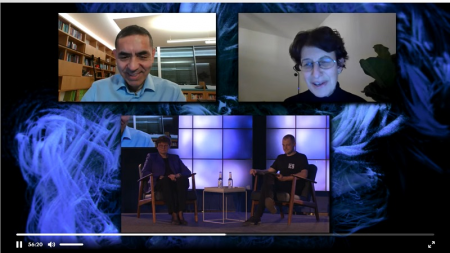
Katalin Karikó and her fellow German researchers mentioned that they were already convinced that ‘the mRNA works’. Upon proving this fact with experiments, they celebrated with a box of chocolate hazelnuts and cups of tea.
The potential of the mRNA technology became impressively apparent in the pandemic caused by the novel coronavirus.
BIOREACTOR TO BECOME A SYMBOL
What is the future of mRNA technology? The three researchers answered this question as well.
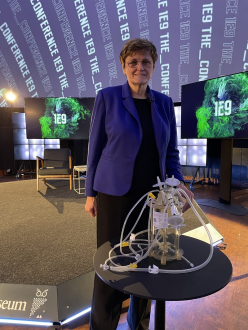
The mRNA offers solutions for an ailment endangering the lives of millions. The long, yet not complete list spreads from infections, such as tuberculosis or HIV, throughout autoimmune disorders to various types of cancer. The application possibilities of mRNA medicines ‘reach the skies’.
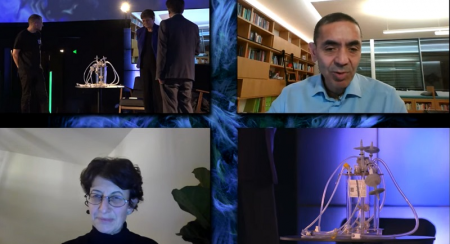
The panel discussion was wrapped up with exchanging gifts. Katalin Karikó, vice-president of BioNTech and winner of the German Future Prize gave a bioreactor to the Deutsches Museum, in which the very first mRNA vaccine was made.
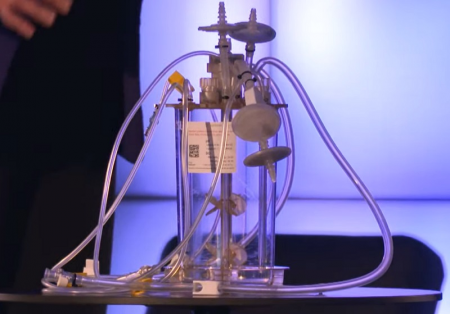
According to the museum’s director-general Wolfgang M. Heckl, the bioreactor symbolises the important role of science and technology in the modern society.
*
The 1E9 panel hosted by the Deutsched Museum titled „BioNTech and the mRNA Revoltuion: The ’Corona-Vaccine’ is only the Beginning” can be rewatched any time online.
SZTEinfo – Ilona Újszászi
Translated by: ZS.P., D.K.
Photo credit: K.K., Deutsches Museum

